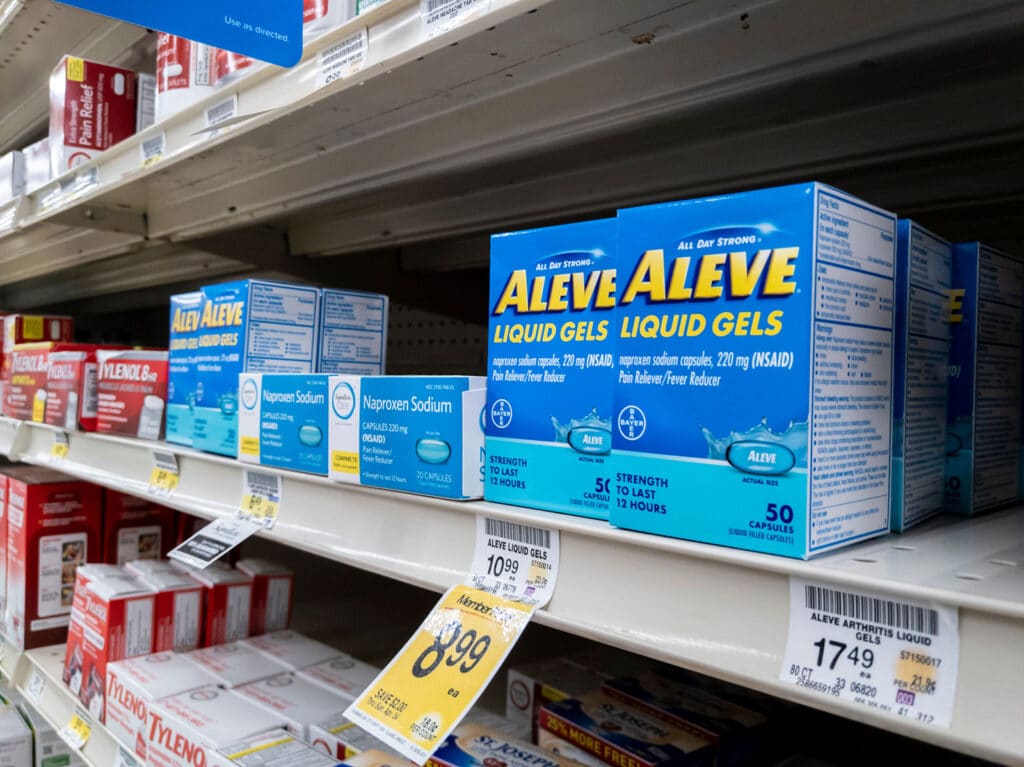Mixing drugs can lead to some substantial side effects, oftentimes much more significant than would be the case if one of those was taken alone. This can be the case for prescription drugs, over-the-counter (OTC) drugs, illegal drugs, all types of drugs. One such example is the mixing of Aleve and alcohol.

What Is Aleve?
What Is Alcohol?
Table of Contents
Can you take Aleve with alcohol?
It’s generally advised to avoid taking Aleve (naproxen) with alcohol. Similar to other pain medications like Tylenol (Acetaminophen) or Advil. Alcohol can increase the risk of stomach bleeding caused by Aleve, and it can also exacerbate potential side effects like dizziness or drowsiness. If you are considering taking both, it’s best to consult with a healthcare professional to discuss your specific situation and potential risks.
How long after taking Aleve can you have alcohol?
The timing of when it’s safe to consume alcohol after taking Aleve (naproxen) can depend on several factors, including your overall health, any other medications you might be taking, and your body’s ability to process both naproxen and alcohol.
Generally, it’s advisable to wait at least 12 to 24 hours after taking naproxen before consuming alcohol. This allows the drug to largely process through your system and decreases the risk of side effects such as stomach irritation or bleeding.
However, because individual responses can vary, it’s a good idea to consult with a healthcare provider for advice tailored to your specific circumstances, especially if you have underlying health conditions or are taking other medications.
| Factor | Details |
|---|---|
| Overall Health | Your current health status can affect how naproxen and alcohol interact in your body. |
| Other Medications | Concurrent medications may influence the risks or side effects when combining naproxen with alcohol. |
| Body’s Processing Ability | The rate at which your body processes naproxen and alcohol can affect the safety of drinking post-naproxen. |
| Recommended Waiting Time | It is generally advisable to wait at least 12 to 24 hours after taking naproxen before consuming alcohol. |
| Risk of Side Effects | Early alcohol consumption can increase the risk of stomach irritation or bleeding. |
| Consultation Advice | Consulting with a healthcare provider is recommended for advice tailored to your specific health conditions. |
Side Effects of Mixing Aleve With Alcohol
As noted above, a couple of common side effects that can impact both those individuals who have taken Aleve (a non-steroidal anti-inflammatory drug) and people who have been consuming alcohol are stomach bleeding and gastritis. This indicates that the risk of suffering from either of these stomach-related ailments, in addition to stomach ulcers and increased stomach bleeding, escalates when these substances are combined.
It should also be noted that it is possible to not experience any adverse effects the first several times you mix these substances and then suddenly suffer from severe stomach-related side effects on the next one. Or the side effects could be felt the first time they are mixed. This variability depends on a number of factors, such as the amount of alcohol consumed and existing conditions like liver disease or kidney problems, and varies from circumstance to circumstance as well as from person to person.
| Aspect | Details |
|---|---|
| Common Side Effects | Stomach bleeding, gastritis, heartburn, indigestion |
| Additional Risks | Stomach ulcers, increased stomach bleeding, gastrointestinal bleeding, serious side effects |
| Effect of Combination | Risk escalates when Aleve and alcohol are combined, potentially leading to alcohol abuse and alcohol addiction |
| Variability of Side Effects | Possible to experience no adverse effects initially, with severe effects appearing suddenly on subsequent occasions, or severe effects may occur from the start. |
| Factors Influencing Variability | Amount of alcohol consumed, existing health conditions like liver disease or kidney problems, drug interactions |
| Individual Differences | Effects vary from person to person and situation to situation; menstrual cramps, abdominal pain can also be exacerbated |
| Organ-Specific Risks | Risk of liver damage, liver damage, cardiovascular issues, heart failure, kidney function impairment, heart attack |
| Medication Management | Importance of adhering to recommended dosage, awareness of drug interactions |
Why Do People Combine Alcohol With Aleve?
People may have a myriad of reasons for combining alcohol with Aleve.
One of the most common ones is to treat alcohol-caused discomfort with the painkilling elements of a pain killer such as Aleve. An example is someone who is suffering from a painful headache or other unpleasant symptoms of a hangover the day after binge drinking alcohol looking to ease that discomfort and turning to the bottle of Aleve that they have nearby.
Reducing the Risk of Side Effects
If you are consuming both Aleve and alcohol only to or less than recommended levels, more times than not, you will not experience any noticeable adverse reactions. Conversely, increasing either beyond its recommended use will naturally enhance that risk while increasing both beyond what is recommended will result in a much greater likelihood of developing these types of side effects.

There are a few things that you can do to reduce the risk of stomach-related side effects other than keeping your use of both to moderate levels or below.
Do not take other NSAIDs, such as ibuprofen, in addition to Aleve. That is because Aleve is not the only NSAID that can cause ailments such as stomach bleeding and gastritis; all NSAIDs can. And, of course, if you take a different NSAID and refrain from consuming Aleve, keep use of that to the recommended amount or below.
If you have a medical history that contains instances of stomach bleeding, gastritis or similar ailments such as stomach ulcers, you may want to avoid using both alcohol and Aleve. At a minimum, reduce usage of both while seriously considering using a non-NSAID pain reliever instead of Aleve.
Also keep in mind that taking the lowest dose possible that provides you with an effective amount of pain relief helps reduce the risk of Aleve-related side effects.
In addition, note that regularly using Aleve at or below its recommended single-use amount but for a longer time period than you should, such as for weeks, will instead increase the chances of stomach issues.
And consider that combining alcohol with that form of pain relief always has the potential to cause side effects, even if alcohol use is moderate and Aleve is being consumed as directed by a healthcare professional.

When to Contact a Medical Professional
Those who are coughing or vomiting up blood or have bloody or black stools should reach out to a medical professional right away for medical attention. Individuals who are experiencing long-lasting stomach pain should also seek medical advice.
Getting Treatment for Overuse
If you are suffering from an addiction to alcohol, to Aleve or, for that matter, to any other substance and would like information about how we can help treat that here at Garden State Treatment Center, reach out to us today. We offer flexible rehab programs that often feature individual and group therapy sessions.
We want to help those who come to us for assistance gain control over their addiction and move forward towards a new path in their life that is much more focused on a healthier lifestyle.
Published on: 2024-04-21
Updated on: 2024-05-24



